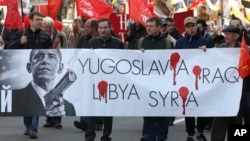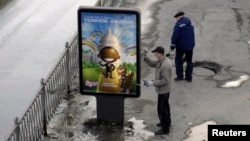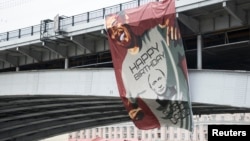In an opinion piece published in the Washington Post this week, Paula Dobriansky, who served as U.S. Under Secretary of State for Democracy and Global Affairs from 2001 to 2009, and David Rivkin, a former Justice Department official in the administrations of Ronald Reagan and George H. W. Bush, wrote that "racist and scatological salvos" have become a regular feature of attacks on foreign leaders, including President Barack Obama, in Russia's media - most of which is state-controlled - and in Russian society at large.
"Russia’s print and electronic media channels carry stories depicting Obama as lazy and incompetent," they wrote. "Shops sell bumper stickers, posters, T-shirts and cardboard cut-outs with images of Obama as an ape and a chimney sweep. One Russian city held a contest inviting children to kick Obama’s cardboard image. Obama has been burned in effigy on numerous occasions, and zoo animals have been named after him, including a black piglet at the Volgograd zoo."
‘Comes from the top’
According to Russian analysts, President Vladimir Putin has played a role in the growth of anti-American sentiment in Russia, and the tone of his statements about the United States teeter on the edge of the permissible. Thus, while he spoke about the need to build constructive relations with the United States during his traditional end-of-year press conference last month, Putin also unleashed a diatribe, in which he suggested "someone in the Turkish government decided to lick the Americans in a certain place."
Igor Yakovenko, a former secretary of the Union of Russian Journalists and current head of the Public Expertise Foundation, believes that the impulse to engage in such invective during public discussions on foreign policy topics "comes from the top."
"Obviously, the 'troubled' past of the Russian president dictates the style of his statements, and this undoubtedly sets the example to follow in the public forum," he told VOA, referring to Putin's own account growing up in the mean streets of St. Petersburg. "We see a pervasive rudeness emanating from politicians, TV presenters and journalists. It is impossible not to notice."
According to Yakovenko, some Russian politicians engage in openly racist attacks on an African-American president of the United States, and this has no adverse effect on their political fortunes.
"In a normal country, this surely would have resulted in, if not criminal penalties, then at least the end of his political career," he said. "But this does not happen in Russia. And it is certainly a trend set by the president."
‘Serious sign of degradation’
Yakovenko believes those in power are playing on age-old prejudices.
"On the one hand, there is the backdrop of everyday racism and anti-Semitism," he said. "And those at the top say: 'Guys, anything goes, now everybody's doing it!' This is quite a serious sign of degradation."
In the future, he added, substantial work will be required to "de-Putinize" Russian society.
Lyubov Borusyak, a sociologist at Moscow's Higher School of Economics, and Alexei Levinson, head of the social and cultural studies department of the Levada Center, an independent Russian polling agency, wrote last November that the wave of anti-Americanism in Russia is "a means of escaping from difficult internal problems."
"The more difficult the problem, the more it [anti-Americanism] is in demand," they wrote. "In Russia, when a crisis starts to be felt more acutely, anti-American sentiment seriously gains momentum. The U.S., as polls show, is at the head of the list of countries unfriendly [and] hostile to Russia."
In an interview with VOA, independent political analyst Dmitry Oreshkin said he was somewhat surprised by Putin's chosen course.
"Because this is an obvious path to degradation," he said. "Culture tends to be complicated; it is only barbarians who simplify everything. This is why we see a country in search of enemies – both internal and external. The hatred of the United States forms out of this."
Handiwork of spin doctors
According to Oreshkin, such attitudes are deliberately nurtured in order to create a "binary picture of the world, via which Lenin came to power and Stalin maintained his power."
He added: "For example, practically no Russians have ever been to the United States. Nonetheless, America is the most important element of frequent conversations at work, in the kitchen. You hear it everywhere: America has surrounded us, placed its military bases everywhere. This is seen as an axiom that no one asks to be proven."
Oreshkin sees the handiwork of political spin doctors in the current wave of anti-Americanism.
"The image of America is completely artificial, and Putin needs it to save his political regime," he said.
Likewise, Igor Yakovenko says anti-Americanism is the key element in the Kremlin's efforts to mobilize Russian society.
"It is a necessary condition for the consolidation of society against a common enemy," he said. "And who could be the 'perfect' enemy – America, of course."







